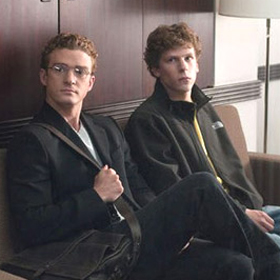The Social Network

4.5/5
The Social Network is the kind of movie that studios dream about—it is mainstream enough to portend box office success, but has enough cache to aim for the Oscars. And Columbia Pictures should, in fact, aim for the Oscars because they have on their hands two career-defining acting performances and a killer screenplay. Not to mention the best movie of the year so far.
The dialogue comes at you quickly—the characters begin speaking before the pre-roll credits have even completed—and never lets up. The capable cast flies through Aaron Sorkin’s masterful screenplay at a super-speed pace that will be familiar to fans of Sorkin’s The West Wing. If you look down at your phone for two seconds, you’re certain to miss a line or two.
It’s as if Jesse Eisenberg and Andrew Garfield were born to read Sorkin’s words—the fast banter flowing effortlessly between them. Eisenberg stars as Mark Zuckerberg, Harvard student, Facebook founder, world’s youngest billionaire. The first scene’s last line and the film’s last line carefully mirror one another, informing the audience of the question left to ponder: is Zuckerberg an asshole? Eisenberg brilliantly navigates the moral ambiguity, never letting you like or dislike Zuckerberg too extremely, yet remaining utterly captivating throughout. Eisenberg showed promise in Adventureland and The Squid and the Whale, but his performance here elevates him to the next level. He should be a strong contender come award season. Likewise, Garfield shines as Zuckerberg’s best-friend-turned-enemy, Eduardo Saverin.
But as strong as Eisenberg and Garfield are individually, their scenes together drive the heart of the film. It isn’t until the end of the film that you realize how heartbroken you feel about the deterioration of their friendship. Sorkin elegantly builds the emotional core of their relationship brick by brick. The strength of the cast runs deep: Armie Hammer is impressive, playing both the identical Winklevoss twins, sharing every scene with himself. Likewise, Rooney Mara is entrancing in her two scenes as Zuckerberg’s ex-girlfriend. With Garfield putting on the Spidey-suit and Mara getting ready to star in The Girl in the Dragon Tattoo (also directed by David Fincher), The Social Network will likely launch quite a few careers.
The cast features one weak spot, however: Justin Timberlake. The media has been quick to laud Timberlake’s performance as Napster founder Sean Parker, putting him on several magazine covers alongside Eisenberg and Garfield. But his performance isn’t nearly in the same echelon. When he speaks, you can feel the words on the page; it feels like he is reading. He fails to bring much depth to the character, making it easy to cast him off as a villain, which is problematic for a film that’s essentially about social ambiguity.
The film itself has few other weaknesses—it’s an all-time classic. But some of the politics surrounding it are worth discussing. The film presents the points of view of four real people—Zuckerberg, Saverin, and the Winklevoss twins. In interviews, Sorkin has taken smug satisfaction in not taking sides. In the New York Magazine cover story, he said, “Several different—and sometimes contradictory—versions of the story were told. I didn’t choose one and decide that it was the truth. I dramatized the fact that there were conflicting stories.”
Sorkin isn’t as self-aware as he would like us to believe. There is little narrative ambiguity in the film—which is fine when you watch the film, but annoying when contrasted with Sorkin’s ambitions. The Social Network is fairly thesis-driven—I saw the film with six friends, and we all came to the same conclusions. Zuckerberg is a genius with evil tendencies but a good heart. Saverin did nothing wrong and is generally an awesome guy, but just wasn’t particularly visionary. Sean Parker is an asshole. The ‘Winklevi’ didn’t deserve any (or, at least, much) money from the lawsuit, but Saverin did. Even Zuckerberg’s motivations are laid forth transparently—the last shot reveals what Sorkin believes to be his true nature.
Besides the fact that Sorkin is completely oblivious to how his script is received, the “based on a true story” nature of the film makes his dogmatic script problematic because it has real-world impact on real people, not to mention historical memory. Sorkin tells New York Magazine in the same story, “I don’t want my fidelity to be the truth; I want it to be to storytelling,” which is all well and good, but then the movie should feature a disclaimer saying such.
Sorkin tries to have it both ways—he shouldn’t be held to truth, he should be held to ‘art.’ But then shouldn’t the storytelling hold up just as well if he used fictional names and a fictional company? Sorkin doesn’t want to be held to the truth of the narrative, but wants the sexiness and box office draw of the real names, the real company, and the real Harvard. Sorkin’s version of Harvard President Larry Summers is wildly entertaining, but is based completely on conjecture.
But these issues don’t detract from what a spectacular movie The Social Network truly is. It’s a film very much of this generation, including lines that have become commonplace, but are rarely included in movies: “You said mean things about me on your blog,” and “You called me a bitch on the Internet.” What is remarkable, though, is that while the social dynamics are entirely of the times, you see the antiquated computers and watch Zuckerberg use LiveJournal and you can’t help but be struck by how quickly things become outdated in the digital age.
The final scenes of the film are movie-making magic. That Facebook hits one million members at the same time as Zuckerberg loses his only friend is a carefully constructed emotional tour de force. The final scene ends the narrative where it should — with Zuckerberg and Facebook. It’s an incredibly relatable moment, both pathetic and human. Counter-intuitively, while the camera is zoomed in on the computer screen, the final scene makes you realize once and for all that The Social Network isn’t about the Internet at all.
RELATED ARTICLES
Get the most-revealing celebrity conversations with the uInterview podcast!







Leave a comment